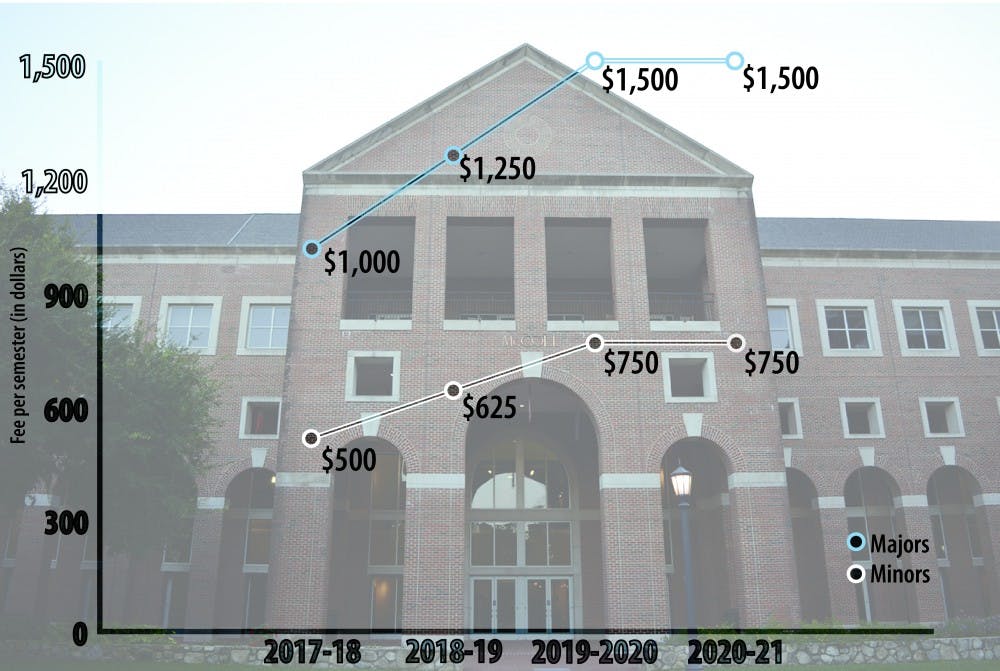Millar said student input has remained a priority.
“I think it’s important to know that we’ve involved students in this process as well,” she said. “So we’ve had both full-time MBA students help us with this project as well as undergraduate business students.”
The fees will contribute to the implementation of a leadership program and a global initiative program. MBA students currently have access to the leadership program, but undergraduates do not.
“It’s state of the art and it’s been recognized by the AACSB, which is our accrediting arm,” Millar said. “That curriculum and content has been established, but we have not had the funds to be able to launch that proven, high-caliber leadership training for undergraduate students.”
The global initiative would provide students with the opportunity to develop cultural intelligence, empathy and adaptability.
“We have cultural savvy workshops and global learning labs where students really go in and focus on things like adaptability and empathy, so when they get abroad they’re more open to taking new experiences and engaging with people of other cultures as well,” Millar said.
David Vogel, director of career development and employee relations for the undergraduate program, said the fees are necessary.
“We looked at other ways that may not be as costly to increase the capacity, and candidly we realize that students don’t want to attend classes at six in the morning or eleven at night,” he said. “We actually did look at a whole array of options, and we felt that the blended online was probably the best balance.”
The distinction between a fee and tuition is important, Vogel said.
“Faculty compensation is something that fee monies cannot go to and Kenan-Flagler had committed to support the expanded population and the enhancements with more faculty, just because we are not going to just grow class size to solve that,” Vogel said. “We will bring on more high-quality, high-cost faculty.”
On Sept. 20, the Student Fee Audit Committee will meet with Kenan-Flagler representatives to review the proposal.
Student Congress Speaker and SFAC member Cole Simons said SFAC looks forward to hearing the proposal.
To get the day's news and headlines in your inbox each morning, sign up for our email newsletters.
“There’s going to be a very active conversation about it and they’re going to come present and we’ll ask them questions and then vote after that,” he said. “I do think the committee is worried about setting a precedent where different undergraduate degrees cost different amounts of money.”
Simons said the committee wants to ensure the University’s standards for affordability are met.
“Our undergrad has always prided itself on being affordable and if all of a sudden one of our programs isn’t affordable, that changes the outlook for the entire school,” he said.
“If you look at where our fees stand compared to other peer institutions, ours are much lower.”
Alex Pritts, a senior business major, said he thinks the fee proposal is worthy of consideration.
“I don’t think it’s that horrible of an idea. I feel like we get so much more, because it’s so separate, that there’s a lot that comes out of this program that I see value in and would be willing to pay for,” he said. “And when you look at other top business programs, especially at the private level, I think $2,000 compared to what those people pay for their programs is a bargain still.”
Grant Purcell, a senior business major, said the proposal could help accessibility.
“It’s getting more and more competitive every year to get into the business school, so to propose the idea that more students can be admitted, I think, is a really great idea,” he said.
“It’s getting to the point when you’re going through the whole process, you see a lot of people who you think deserve to get in, not get in, and this is what they really wanted to do, but they don’t have a chance to do that.”
The business school will request approval from SFAC on Sept. 20. The fee would then pass through the Student Fee Advisory Subcommittee and the Tuition and Fee Advisory Taskforce before reaching the Board of Trustees in November and the Board of Governors in February.
university@dailytarheel.com



